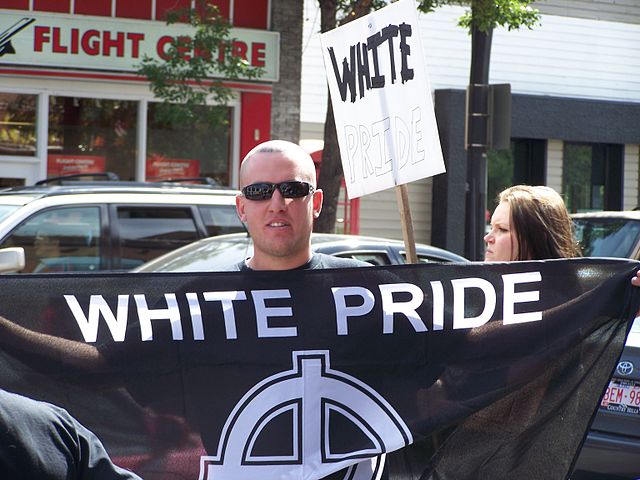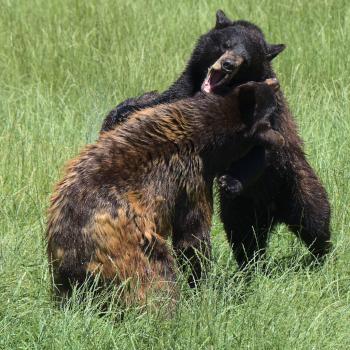As I recently mentioned, a white nationalist has been exposed in my social circle. So I’ve found myself in a lot of discussion about the topic lately and have encountered some attempts to justify that ideology.
Most are pathetically irrational, but there is one that at least tries to take the form of a reasoned argument and comes up often enough to require a reply. It goes like this: “It’s okay for black people to be proud to be black. White people and black people are equal. Therefore it’s okay for white people to be proud to be white.” There are two flaws here. The first is that there is a huge gap between “being proud to be white” and white nationalism. White nationalism is the idea that race is essential to culture and so white people must maintain dominance of the United States in order to preserve American culture. Even if “white pride” were justified, it would not justify white nationalism.
But “white pride” conflates ethnicity with race.
I am proud of my ethnic heritage. My father is the grandson of Polish immigrants. When John Paul II became Pope and when the Solidarity labor union stood up to the Communist Party in Poland, we felt personally invested. And I get a bit of a thrill out of training with Seido Karate students from our dojos in Poland — I might be getting beat up by long-lost cousins.
The family name was changed from Swieczkowski to Swisskowski and then Swiss a few generations back, most likely due to anti-immigrant prejudice. I have a complicated relationship with Polack jokes. And I claim the right to use the word “Polack”, whereas if some purebred WASP type were to use it to refer to my family, they would at the very least invite a raised eyebrow. These experiences — mine and my ancestors — have shaped who I am.
My mother is of more mixed ancestry, Irish and English and German — and, as I recently learned while doing some genealogical research, one ancestor was a Dutch descendant of William of Orange and one of the first settlers in Baltimore County; another was a Revolutionary War patriot. But several of her great-grandparents and great-great grandparents on her mother’s side were Irish immigrants who arrived during the Famine, almost certainly refugees. My mom is a great American mutt.
Those Irish refugees passed on to my grandmother and my mother a primarily Irish identity. And they passed that on to me. I wear green every Irish Pride Day, a.k.a. St. Patrick’s Day, out of fear that my maternal grandmother will rise from her grave, hunt me down, and beat me about the head and shoulders should I neglect to do so. A love of music, a quick temper and a quick forgiveness, a ready laugh that never forgets tragedy; I was taught that these were my inheritance. Just as on the Polish side, the experiences of my ancestors shaped who I am.
My childhood Catholicism had Irish and Polish roots. And in my adult Paganism I feel a bit drawn to Irish and Slavic mythologies, though I haven’t studied either in any depth.
But to generalize that pride and emotional connection to ancestral cultures into racial pride, a pride in an arbitrary classification of physiognomic features, is erroneous.
There is no “white culture”. Europeans spent most of history fighting each other, not uniting in some grand overarching cultural group. If we went back in time two thousand years to find my ancestors on the Irish branch and introduced them to my ancestors on the Slavic branch, they would find each other every bit as foreign as they would find, say, a group of Egyptians from the same time. (Indeed, Egypt was part of the Roman Empire, while Ireland and Poland never were. Despite my “whiteness”, in some respects Egypt has more of a claim to being part of the culture that white nationalists want to preserve than do the homelands of most of my ancestors!)

The picture is complicated by the way that we conflate the African-American ethnic group with the “black race”. African-Americans share an inherited common cultural heritage — a heritage of oppression, to be sure, and a heritage which forcibly blended many African tribes and nations and did its best to strip away their cultures. But from that, the ancestors of today’s African-American built a culture of resilience and creativity, a culture of which its inheritors can justly be proud.
Of course I’m speaking in broad sociological terms here; not all African-Americans are or want to be connected to that culture. But when we speak of “black culture” in the context of American society and politics, we mean the (mostly) shared ethnic cultural heritage of this group. And that heritage would be quite foreign to, say, Muslim Bantus in Somalia. It is the result of the history of a socially-determined group of people, not some genetic inheritance.
(And it does not mean that people who are not African-Americans cannot enjoy and participate in elements of that culture. We’ve already been over how the theory of “cultural appropriation” is wrongheaded — indeed, the theory that culture must be tied to inheritance is something white nationalists largely agree with.)
Now, I had the option to identity with many factors outside of my ethnic heritage, because people were not constantly reminding me that I was an Irish-Polish-American. They couldn’t even tell: no one would mistake me for a purebred WASP but maybe I was Italian-American, maybe I was Jewish-American. (I was mistaken for both as a kid.) So there were more important factors that shaped my sense of self as a child. Heck, watching Star Trek with my parents was probably more important than anything they passed on from distant ancestors.
In contrast, the ethnic heritage of African-Americans has been externally enforced. And that enforcement has links to Western racism and colonialism in Africa. The legacy of that racism and colonialism has given African Americans and African peoples some common socio-political concerns — in other words, racist policies by those in power created “blackness” and gave “black” people common interests. “Whiteness” was created along they way, in the late 1600s as a way to keep low-caste European settlers in the American colonies from joining forces with African slaves.
The ethnic identities that our families pass along to us are part of our lived experience. We can chose to hold tight to them or let them go, but they are real human phenomena: Polishness, Irishness, African-Americanness, whichever. But race is an artificial construct, invented to justify exploitation and keep oppressed people from uniting.
That’s nothing to be proud of.
You can keep up with “The Zen Pagan” by subscribing via RSS or e-mail.
Please consider supporting this blog with a donation or purchase. The Zen Pagan Merch-o-rama has t-shirts, mugs, posters and prints, and stickers designed by yours truly.
If you do Facebook, you might choose to join a group on “Zen Paganism” I’ve set up there. And don’t forget to “like” Patheos Pagan and/or The Zen Pagan over there, too.













